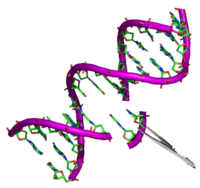
Photo from wikipedia
One of the most prominent justifications for the use of germline gene editing (GGE) is that it would allow parents to have a "genetically related child" while preventing the transmission… Click to show full abstract
One of the most prominent justifications for the use of germline gene editing (GGE) is that it would allow parents to have a "genetically related child" while preventing the transmission of genetic disorders. However, we argue that since future uses of GGE may involve large-scale genetic modifications, they may affect the genetic relatedness between parents and offspring in a meaningful way: Due to certain genetic modifications, children may inherit much less than 50% of their DNA from each parent. We show that the reduction in genetic relatedness between parents and offspring has three important social and legal implications. First, the desire for a genetically related child may end up not being the strong justification it is currently thought to be for the use of GGE. Second, prospective parents may be reluctant to use GGE because of a potential loss of genetic relatedness. Third, in some jurisdictions, parents who would not pass on "enough" DNA to their child may not be recognized as the child's legal parents. We further argue that the reduction in genetic relatedness challenges current conceptions of genetic parenthood that rely on the quantity of DNA shared with the child or on whether the child was directly derived from the parent's genes. We suggest that genetic parenthood should instead be determined based on the nature of the genetic modifications and whether the child's numerical identity has been preserved after the editing process.
Journal Title: Bioethics
Year Published: 2022
Link to full text (if available)
Share on Social Media: Sign Up to like & get
recommendations!